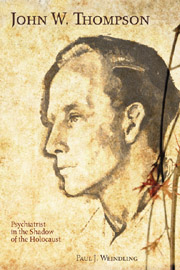Book contents
- Frontmatter
- Contents
- List of Illustrations
- Acknowledgments
- List of Abbreviations
- Part One Into the Dark
- Part Two Redemption
- Part Three Aftermath
- 13 UNESCO: At the Conscience of the World
- 14 The Eau Vive Affair
- 15 Sebastian
- 16 Matthias
- 17 Child Guide
- 18 New York: “St. John the Psychiatrist”
- 19 Hallucinations
- 20 “Dying We Live”
- Appendix John Thompson's Writings
- Notes
- Sources
- Index
13 - UNESCO: At the Conscience of the World
from Part Three - Aftermath
Published online by Cambridge University Press: 12 September 2012
- Frontmatter
- Contents
- List of Illustrations
- Acknowledgments
- List of Abbreviations
- Part One Into the Dark
- Part Two Redemption
- Part Three Aftermath
- 13 UNESCO: At the Conscience of the World
- 14 The Eau Vive Affair
- 15 Sebastian
- 16 Matthias
- 17 Child Guide
- 18 New York: “St. John the Psychiatrist”
- 19 Hallucinations
- 20 “Dying We Live”
- Appendix John Thompson's Writings
- Notes
- Sources
- Index
Summary
Psychological Therapist
Thompson withdrew from Germany as a military officer, only to reenter it as a cultural missionary; the RCAF puzzled over his tangled record of appointments, reappointments, and acting ranks. His efforts to keep his uniform and rank for a few more months were declined, and he was finally demobilized on July 17, 1947. Even so, he worked for A. C. Somerhough's War Crimes Unit until September 12, 1947. His discharge address was the Spenders' haven at 15 Loudoun Road in St. John's Wood, London. Thompson confided to them how acutely deranged and demoralized he felt amid the stress and strife of the postwar world. He hoped UNESCO could provide a cure for the world's spiritual malaise.
UNESCO's birth on November 16, 1945 coincided with the opening of the International Military Tribunal. UNESCO set out to assist the world's recovery from war and oppression. In November 1946, the Netherlands proposed developing “the spiritual basis of the culture of the nations” to build universal peace. Germany was an opportunity for UNESCO to fulfil its mission of securing peace through reeducation UNESCO saw an opportunity in the Cultural Exchange Program of the Civil and Administrative Division under OMGUS, the U.S. military government: “Democratisation projects” included medical education, mental health practices, schools of public health, a model school of nursing, a community health center for demonstration and teaching purposes, medical research, a medical library, a tuberculosis control program, narcotics control, maternal and child health surveys, development of institutional services for the aged and for juveniles, and rehabilitation of the physically handicapped.
- Type
- Chapter
- Information
- John W. ThompsonPsychiatrist in the Shadow of the Holocaust, pp. 177 - 202Publisher: Boydell & BrewerPrint publication year: 2010



